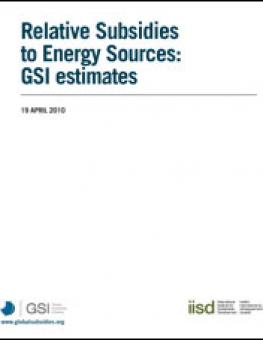
Relative Subsidies to Energy Sources: GSI estimates
The true scale of energy subsidies is difficult to ascertain, due to different definitions of subsidies, calculation methodologies, levels of transparency and data collection regimes in different countries. This working paper summarizes a series of estimates of how large subsidies might be.
The true scale of energy subsidies is difficult to ascertain, due to different definitions of subsidies, calculation methodologies, levels of transparency and data collection regimes in different countries around the world. This working paper summarizes a series of estimates of how large subsidies might be, by energy source, based on a preliminary investigation of publicly available research.
It also outlines the assumptions behind the estimates. The estimates will be progressively refined as the Global Subsidies Initiative's (GSI) program on fossil-fuel subsidy reform progresses.
For GSI's in-depth reports on biofuel subsidies, fossil-fuel subsidies and more, please click here.
You might also be interested in
Tree Planting for Climate Resilience in Freetown, Sierra Leone
This assessment presents the economic valuation of tree planting efforts in Freetown, Sierra Leone, including planting costs, added benefits, and avoided costs.
Sustainable Asset Valuation of Sherwan Hill Adventure Park in Abbottabad, Pakistan
This report analyzes the social, economic, and environmental benefits of the Sherwan Hill Adventure Park in Pakistan.
December 2024 | Carbon Minefields Oil and Gas Exploration Monitor
In November 2024, 23 oil and gas exploration licences were awarded across five countries, with Russia granting the licences that account for the largest portion of embodied emissions.
Toward a Coherent, Transformative Approach to Financing Sustainable Development, Climate, and Nature
Four key proposals for the Fourth Financing for Development Conference (FfD4) to create an integrated, equitable approach to financing climate, nature, and development goals.